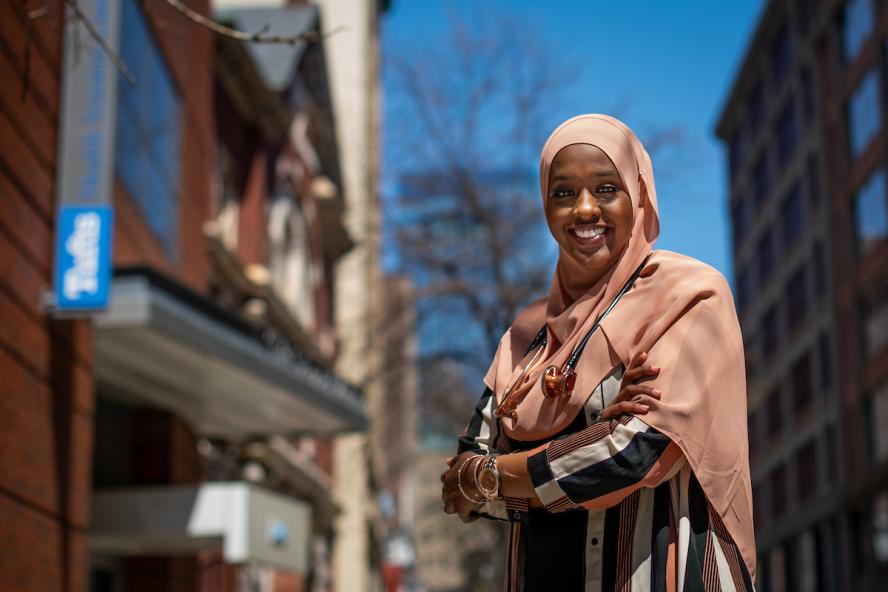-
About
- Departments & Offices
-
Academics
- Physician Assistant
- Special Master’s (MBS)
-
Admissions & Financial Aid
- Tuition & Fees
-
Student Life
-
- Student Resources by Program
- Academic & Student Support
- Wellness & Wellbeing
- Student Experience
- Events & Traditions
-
-
Research
- Research Labs & Centers
-
Local & Global Engagement
- Global Health Programs
- Community Engagement
Finding Her Super Power
Graduating medical student Asha Mohamud reflects on compassionate care

Asha Mohamud, M21, often has many questions when she walks into a patient’s room, but she always starts with the same one: “How’s your spirit?”
“I want my patients to feel like there is another human being in the room,” said Mohamud, who is poised to become the second-ever Somali woman physician in the state of Maine when she graduates from Tufts University School of Medicine this month. “To feel heard, validated, and like they’re interacting with a kind face who just happens to be in charge of their care.”
Kindness and support were what got her through a tough four years capped off by a global pandemic, said Mohamud, who will soon begin a residency in internal medicine at Maine Medical Center in Portland, about an hour south of Lewiston, where she grew up.
Family, friends, and colleagues saw the potential in her even when she didn’t—especially during her third year of medical school, as she began clinical rotations for the first time, and “imposter syndrome” kicked in.
“There were times when those feelings of doubt, of feeling like a fraud, were heightened. I didn’t see myself as a doctor. I wanted to give up. But my family weathered many of those storms for me,” said Mohamud. Close friends are high on her list of people to thank, too: “These are human beings who believed in my dreams even when I did not believe in them myself."
Mohamud carried this support forward when, after what felt like two years of nonstop studying, she started caring for patients in her third year. “Everything finally made sense,” Mohamed recalled thinking as she moved beyond the medical aspect of a diagnosis, to the emotional one.
She discovered early on that she had a knack for making patients feel comfortable, or “knowing patients beyond their charts.” For example, when patients are diagnosed with cancer, Mohamud makes sure to begin their next interaction by asking them not about medications or upcoming procedures, but about their hobbies, children, careers, and emotions. Even two or three minutes of experiencing someone’s kind interest can give people a sense of calm in stressful situations, she said.
She learned to apply that principle to her own life, making sure to take breaks and extend compassion to herself when she felt doubt or wanted to give up. As an aspiring doctor, “you have to practice self-care on yourself,” she said. “Otherwise, you won’t know how to do it, and it’s a guaranteed way to burn out. It’s actually easier to overwork yourself, than it is to admit to yourself that you are human and need a break sometimes.”
Mohamed’s fourth year provided a final lesson in the power of care and compassion. As the pandemic broke out, schedules changed, and rotations were cancelled, she was overwhelmed at first—but she took heart from classmates who created care packages for people struggling with housing insecurity, many of which included batches of hand sanitizer that one classmate made in her kitchen.
“My classmates rallied behind one another and checked in on each other frequently. You could feel the camaraderie exuding behind our Zoom screens,” Mohamud said.
Combating imposter syndrome and helping others amid a pandemic, both stem from the same truth that has made patients some of Mohamud’s best teachers. This has helped Mohamud grow into a doctor dedicated to emotional—as well as physical—care.
“There’s something really beautiful about interacting with humanity in its most vulnerable state,” she said.
The secret to her superpower? “Making sure their soul is taken care of,” Mohamud said.